By Telos Press · Thursday, February 4, 2021 In today’s episode of the Telos Press Podcast, Camelia Raghinaru talks with Jon Simons about his article “Divine Violence, Profane Peace: Walter Benjamin, Rabbis for Human Rights, and Peace in Israel–Palestine,” from Telos 192 (Fall 2020). An excerpt of the article appears here. If your university has an online subscription to Telos, you can read the full article at the Telos Online website. For non-subscribers, learn how your university can begin a subscription to Telos at our library recommendation page. Purchase a print copy of Telos 192 in our online store.
Listen to the podcast here.
Continue reading →
By Jon Simons · Friday, October 16, 2020 Jon Simons’s “Divine Violence, Profane Peace: Walter Benjamin, Rabbis for Human Rights, and Peace in Israel–Palestine” appears in Telos 192 (Fall 2020): Truth and Power. Read the full article at the Telos Online website, or purchase a print copy of the issue in our online store. Individual subscriptions to Telos are available in both print and online formats.
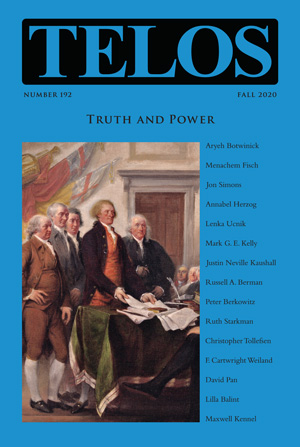 One of the reasons for disaffection toward peace among Jewish Israelis may be a “Judaic deficit” in the secular, liberal conceptions of peace implicit in both official peace processes and peace activism. I address this deficit by bringing the Judaically inflected but nonreligious work of Walter Benjamin into conversation with the thought and practice of Rabbis for Human Rights, who combine Judaism with liberal, universal rights. Benjamin’s essay “Critique of Violence” counters the legally enforced violence of liberal peace with a conjugation of divine violence and nonviolent conflict resolution. Interpreting his essay with particular attention to his reading of the Biblical story of Korah leads to a theologico-political notion of peace as agonistic, human wrestling with divine violence and power. Rabbis for Human Rights embody such peace to some degree in their simultaneous interpretation of divine law and “small acts” of nonviolent opposition to Occupation. One of the reasons for disaffection toward peace among Jewish Israelis may be a “Judaic deficit” in the secular, liberal conceptions of peace implicit in both official peace processes and peace activism. I address this deficit by bringing the Judaically inflected but nonreligious work of Walter Benjamin into conversation with the thought and practice of Rabbis for Human Rights, who combine Judaism with liberal, universal rights. Benjamin’s essay “Critique of Violence” counters the legally enforced violence of liberal peace with a conjugation of divine violence and nonviolent conflict resolution. Interpreting his essay with particular attention to his reading of the Biblical story of Korah leads to a theologico-political notion of peace as agonistic, human wrestling with divine violence and power. Rabbis for Human Rights embody such peace to some degree in their simultaneous interpretation of divine law and “small acts” of nonviolent opposition to Occupation.
Continue reading →
By David Pan · Friday, September 25, 2020 Telos 192 (Fall 2020): Truth and Power is now available for purchase in our store. Individual subscriptions to Telos are also available in both print and online formats.
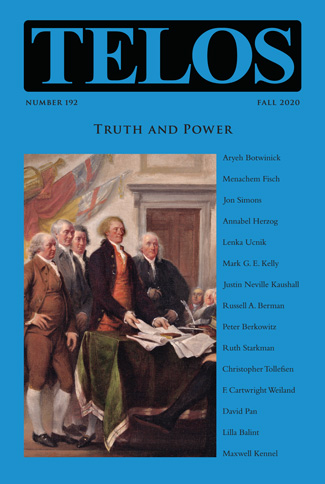 There is a strong temptation to oppose the idealism of truth to the realism of power in order to criticize and turn away from politics as a base pursuit. Science, facts, and ideals are cited as the objective truths that so often are ignored in favor of ideology, lies, and self-interest by those who wield power. Yet this opposition between truth and power can itself become a dubious tactic, as it is often the speaker who seeks to define an opinion as truth. This situation is complicated by the circumstance that there are three forms of truth that are often merged in such discussions. There is a strong temptation to oppose the idealism of truth to the realism of power in order to criticize and turn away from politics as a base pursuit. Science, facts, and ideals are cited as the objective truths that so often are ignored in favor of ideology, lies, and self-interest by those who wield power. Yet this opposition between truth and power can itself become a dubious tactic, as it is often the speaker who seeks to define an opinion as truth. This situation is complicated by the circumstance that there are three forms of truth that are often merged in such discussions.
First, there are natural scientific truths that even autocrats and totalitarians do not seek to deny, as they are the source of the technological tools that can support any attempt to maintain power. Here, there is certainly no conflict between truth and power. Not only does political power depend on technological achievement, but natural scientific facts cannot be covered up by lies and ideology for long. Consequently, political actors must pay attention to natural scientific and technical knowledge, even if they then instrumentalize it in different ways.
Continue reading →
By Joseph Weiss · Wednesday, April 22, 2020 Joseph Weiss’s “The Old in New Critical Theory: Locating the Gambler and the Prostitute in the Image of Neoliberalism” appears in Telos 190 (Spring 2020): Economy and Ecology: Reconceiving the Human Relationship to Nature. Read the full article at the Telos Online website, or purchase a print copy of the issue in our online store. Individual subscriptions to Telos are available in both print and online formats.
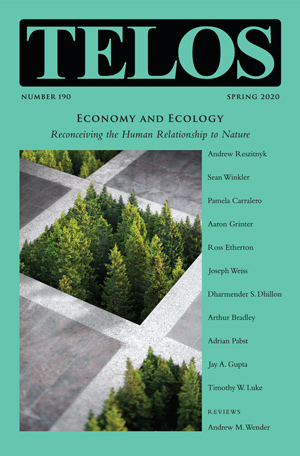 This essay is part of a larger project that aims to trace the return of the old in “new” critical theory. It attempts to demonstrate how, after the failure of the second generation of the Frankfurt School to situate the ongoing antagonisms of neoliberal social relations, several of the concepts of the first generation weigh on the comportment of “new” critical theory. More specifically, by examining the figures of the gambler and the prostitute in relationship to Walter Benjamin and Theodor W. Adorno’s conception of the dialectical image, we observe just how much the critique of commodity fetishism, the use of rhetoric in historico-philosophical presentation, as well as the analysis of political economy and class relations, continue to assert themselves as pressing needs for social theory. In beginning to perform this “new” critical theory that heeds the dialectical tension between the past and present, an image of the unfulfilled desires at work in both the idea of communism and neoliberalism ultimately comes to the fore. Instead of undialectically discarding these figures as morally bankrupt or expressions of mere illusion and falsehood, we are called to capture the truth of their appearance, i.e., the ambivalent desire that promises submission to domination at the same time that it highlights an indispensable moment in the real possibility of emancipation. This essay is part of a larger project that aims to trace the return of the old in “new” critical theory. It attempts to demonstrate how, after the failure of the second generation of the Frankfurt School to situate the ongoing antagonisms of neoliberal social relations, several of the concepts of the first generation weigh on the comportment of “new” critical theory. More specifically, by examining the figures of the gambler and the prostitute in relationship to Walter Benjamin and Theodor W. Adorno’s conception of the dialectical image, we observe just how much the critique of commodity fetishism, the use of rhetoric in historico-philosophical presentation, as well as the analysis of political economy and class relations, continue to assert themselves as pressing needs for social theory. In beginning to perform this “new” critical theory that heeds the dialectical tension between the past and present, an image of the unfulfilled desires at work in both the idea of communism and neoliberalism ultimately comes to the fore. Instead of undialectically discarding these figures as morally bankrupt or expressions of mere illusion and falsehood, we are called to capture the truth of their appearance, i.e., the ambivalent desire that promises submission to domination at the same time that it highlights an indispensable moment in the real possibility of emancipation.
Continue reading →
Melayna Lamb and German E. Primera’s “Sovereignty between the Katechon and the Eschaton: Rethinking the Leviathan” appears in Telos 187 (Summer 2019). Read the full article at the Telos Online website, or purchase a print copy of the issue in our online store. Individual subscriptions to Telos are available in both print and online formats.
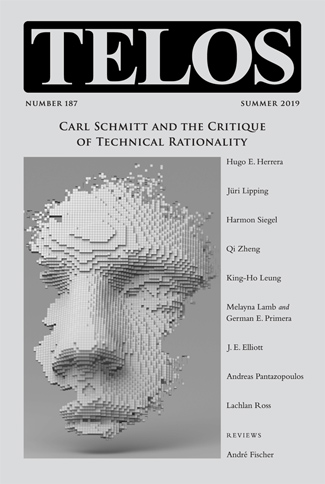 This paper both rejects the reading of Thomas Hobbes’s Leviathan as a secularized katechon and rethinks anew the questions of sovereignty and politics in his thought. It does so by examining the eschatological character of his politico-theological understanding of the relation between the kingdom of the Leviathan and the kingdom of God. Indeed, through different contemporary readings of Hobbes’s theory of the state, this paper offers an insight into the concrete eschatology at operation in Hobbes’s thought and underscores its relevance for the understanding of government, biopolitics, and sovereignty. This is achieved through two different, albeit interconnected undertakings, which in turn allow us to agree but also to go beyond Giorgio Agamben’s claim that the state, in Hobbes, does not have a katechontic function. The first is an exposition of the a-teleological character of Hobbes’s eschatology and his metaphysics of motion. The second involves a consideration of the temporality and the nature of the relation between the ahistorical world of reason and the historical world of faith that underpins Hobbes’s theory of the state. Contrary to the contemporary interpretations in which Hobbes’s eschatology is presented as future regarding, we will highlight the chronological coincidence between the historical time of faith and the ahistorical time of the Leviathan, placing Hobbes within the political coordinates of Walter Benjamin’s messianism. By bringing this eschatological perspective to the fore, not only will the reading of Hobbes’s theory of sovereignty that aligns him with liberalism be problematized, but also an analysis of the resources that Hobbes offers to imagine a different form of politics will be developed. This paper both rejects the reading of Thomas Hobbes’s Leviathan as a secularized katechon and rethinks anew the questions of sovereignty and politics in his thought. It does so by examining the eschatological character of his politico-theological understanding of the relation between the kingdom of the Leviathan and the kingdom of God. Indeed, through different contemporary readings of Hobbes’s theory of the state, this paper offers an insight into the concrete eschatology at operation in Hobbes’s thought and underscores its relevance for the understanding of government, biopolitics, and sovereignty. This is achieved through two different, albeit interconnected undertakings, which in turn allow us to agree but also to go beyond Giorgio Agamben’s claim that the state, in Hobbes, does not have a katechontic function. The first is an exposition of the a-teleological character of Hobbes’s eschatology and his metaphysics of motion. The second involves a consideration of the temporality and the nature of the relation between the ahistorical world of reason and the historical world of faith that underpins Hobbes’s theory of the state. Contrary to the contemporary interpretations in which Hobbes’s eschatology is presented as future regarding, we will highlight the chronological coincidence between the historical time of faith and the ahistorical time of the Leviathan, placing Hobbes within the political coordinates of Walter Benjamin’s messianism. By bringing this eschatological perspective to the fore, not only will the reading of Hobbes’s theory of sovereignty that aligns him with liberalism be problematized, but also an analysis of the resources that Hobbes offers to imagine a different form of politics will be developed.
Continue reading →
By Agata Bielik-Robson · Wednesday, April 24, 2019 Agata Bielik-Robson’s “Marrano Universalism: Benjamin, Derrida, and Buck-Morss on the Condition of Universal Exile” appears in Telos 186 (Spring 2019). Read the full article at the Telos Online website, or purchase a print copy of the issue in our online store. Individual subscriptions to Telos are available in both print and online formats.
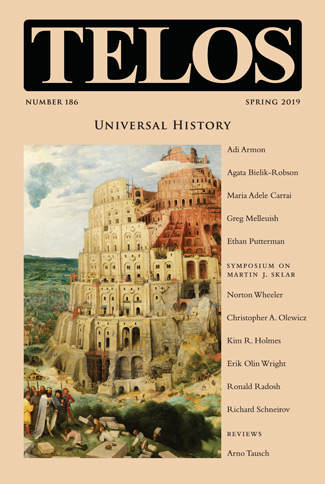 In this article, I would like to outline a new strategy for the universalization of history, which emerges from an analysis of the modern Jewish practice of philosophizing. I call it a Marrano strategy, building an analogy between the religious practices of the late-medieval Sephardic Jewry, which was forced to convert to Christianity but kept Judaism “undercover,” and the philosophical intervention of modern Jewish thinkers who spoke the seemingly universal idiom of Western philosophy but, at the same time, impregnated it “secretly” with the motives deriving from their “particular” background. This secret particularist lining did not serve to abolish the universalist perspective, but merely to transform it; for the last heirs of this “Marrano” line, Walter Benjamin and Jacques Derrida, the proper universalism amounts to an after-Babel project of mending the broken whole from within, horizontally, without assuming the abstract position of a general meta-language, but through the multilingual “task of translation.” In this article, I would like to outline a new strategy for the universalization of history, which emerges from an analysis of the modern Jewish practice of philosophizing. I call it a Marrano strategy, building an analogy between the religious practices of the late-medieval Sephardic Jewry, which was forced to convert to Christianity but kept Judaism “undercover,” and the philosophical intervention of modern Jewish thinkers who spoke the seemingly universal idiom of Western philosophy but, at the same time, impregnated it “secretly” with the motives deriving from their “particular” background. This secret particularist lining did not serve to abolish the universalist perspective, but merely to transform it; for the last heirs of this “Marrano” line, Walter Benjamin and Jacques Derrida, the proper universalism amounts to an after-Babel project of mending the broken whole from within, horizontally, without assuming the abstract position of a general meta-language, but through the multilingual “task of translation.”
Continue reading →
|
|







